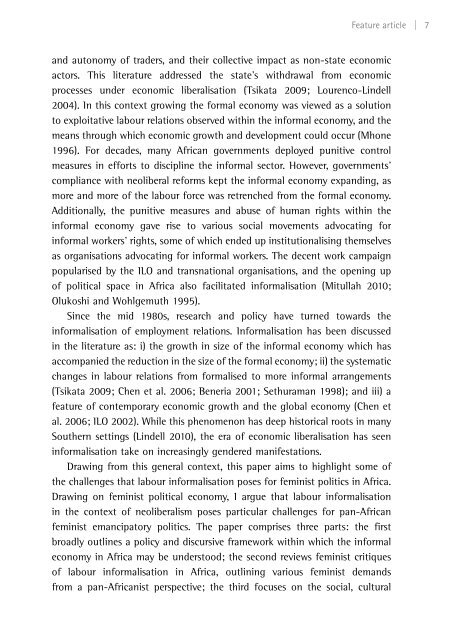You also want an ePaper? Increase the reach of your titles
YUMPU automatically turns print PDFs into web optimized ePapers that Google loves.
Feature article | 7<br />
<strong>and</strong> autonomy of traders, <strong>and</strong> their collective impact as non-state economic<br />
actors. This literature addressed the state’s withdrawal from economic<br />
processes under economic liberalisation (Tsikata 2009; Lourenco-Lindell<br />
2004). In this context growing the formal economy was viewed as a solution<br />
to exploitative labour relations observed within the informal economy, <strong>and</strong> the<br />
means through which economic growth <strong>and</strong> development could occur (Mhone<br />
1996). For decades, many African governments deployed punitive control<br />
measures in efforts to discipline the informal sector. However, governments’<br />
compliance with neoliberal reforms kept the informal economy exp<strong>and</strong>ing, as<br />
more <strong>and</strong> more of the labour force was retrenched from the formal economy.<br />
Additionally, the punitive measures <strong>and</strong> abuse of human rights within the<br />
informal economy gave rise to various social movements advocating for<br />
informal workers’ rights, some of which ended up institutionalising themselves<br />
as organisations advocating for informal workers. The decent work campaign<br />
popularised by the ILO <strong>and</strong> transnational organisations, <strong>and</strong> the opening up<br />
of political space in Africa also facilitated informalisation (Mitullah 2010;<br />
Olukoshi <strong>and</strong> Wohlgemuth 1995).<br />
Since the mid 1980s, research <strong>and</strong> policy have turned towards the<br />
informalisation of employment relations. Informalisation has been discussed<br />
in the literature as: i) the growth in size of the informal economy which has<br />
accompanied the reduction in the size of the formal economy; ii) the systematic<br />
changes in labour relations from formalised to more informal arrangements<br />
(Tsikata 2009; Chen et al. 2006; Beneria 2001; Sethuraman 1998); <strong>and</strong> iii) a<br />
feature of contemporary economic growth <strong>and</strong> the global economy (Chen et<br />
al. 2006; ILO 2002). While this phenomenon has deep historical roots in many<br />
Southern settings (Lindell 2010), the era of economic liberalisation has seen<br />
informalisation take on increasingly gendered manifestations.<br />
Drawing from this general context, this paper aims to highlight some of<br />
the challenges that labour informalisation poses for feminist politics in Africa.<br />
Drawing on feminist political economy, I argue that labour informalisation<br />
in the context of neoliberalism poses particular challenges for pan-African<br />
feminist emancipatory politics. The paper comprises three parts: the first<br />
broadly outlines a policy <strong>and</strong> discursive framework within which the informal<br />
economy in Africa may be understood; the second reviews feminist critiques<br />
of labour informalisation in Africa, outlining various feminist dem<strong>and</strong>s<br />
from a pan-Africanist perspective; the third focuses on the social, cultural


